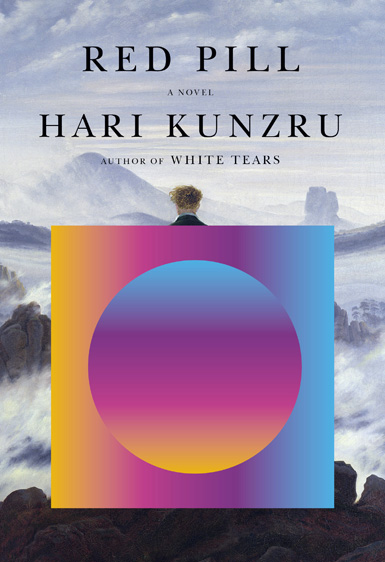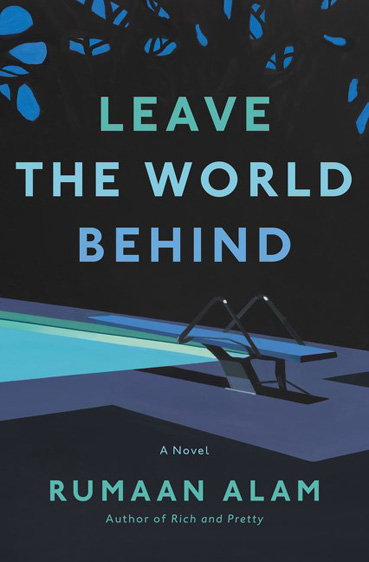-
March 24, 2021
Quarterfinals
-
Hari Kunzru
3Red Pill
v.
2Leave the World BehindRumaan Alam
-
Judged by
Kamil Ahsan
In Nella Larsen’s 1929 novel Passing, set in the 1920s, we meet a woman named Claire. Claire is a mixed-race woman who passes as white. From the perspective of the narrator, Irene, the fact that Claire passes as white and marries a white man who does not know of her heritage is a Damning Indictment of the very character of Claire. To Irene, who can also pass but only in what to her are benign instances, living in Harlem, being imbricated in Black society and culture comes naturally. When Claire tries to have it both ways, reintroducing herself to Black society whilst maintaining the charade of her white marriage, it is yet more evidence for Irene—and for this reader, at least—that Claire’s fundamental dishonesty is somewhat beyond the pale.
The Damning Indictment functions here as a literary device that evokes a familiarity with the indecency or bad-ness of some people in our own lives, and thus an instinctive judgment of them. They are affective registers that by design are exceedingly hard to make the reader abandon, primarily because it is not altogether too ambiguous that the novel intends for the character to be Damningly Indicted. The reader must believe this intention and take it as given. Larsen then spends the course of the novel progressively casting doubt on the initial judgment by examining Claire. This is why I find Passing so fascinating. After all, we all think we know bad people, but what do we really know about this whole business of “passing” in lived experience? It’s just familiar and unfamiliar enough. What if, for instance, I found out one of my close friends lived like a reverse-Rachel Dolezal? Eschewing their brownness (if that were possible) and having absolutely no real problem with doing it. What would I do? What if I could also “pass” and had made a strong decision not to—would I, like Irene, continue to take a strong stand while occasionally lapsing; say, in front of a mall clerk, who offers me the good shit because I appear to be a white man?
Both Hari Kunzru’s Red Pill and Rumaan Alam’s Leave the World Behind use the Damning Indictment at fairly pivotal moments in the course of their narratives. In Red Pill, the narrator himself is a bit of a suspect character. Away at a writing fellowship retreat in a Berlin suburb, the narrator is reclusive, obsessed with the nihilist Romantic writer Heinrich von Kleist, and compulsively binges a mysterious but obviously racist contemporary American cop show called Blue Lives that he evinces little compunction with. The narrator clashes with an ancillary character who is puffed up and arrogant, but the narrator himself seems devoid of moral principle, mostly a character of deep egocentrism and insecurity. None of this is particularly damning as indictments go. The real Damning Indictment, as it happens, comes about two thirds of the way through when the narrator meets the creator of Blue Lives: Anton. Anton is familiar. His motives with his TV show are ideologically diabolical. His rhetoric is designed to twist the narrator into a power struggle about racism. Fully embracing the positionality of the racist, he burrows in around it to justify it by any means possible. In a key exchange with Anton and his friends, the narrator reels in disgust at Anton’s provocations. Anton tells him:
Your weakness is that you’re always surrounded by people who think just like you. When you meet someone who your silly shame tactics don’t work on, you don’t know how to act. I’m a racist because I want to be with my own kind and you’re a saint because you have a sentimental wish to help other people far away, nice abstract refugees who save you from having to commit to anybody or anything real.
There’s a full range of Note Books and related stationery products at fieldnotesbrand.com. Field Notes is proud to once again be a sponsor of the Tournament of Books.
Like most of us, the narrator is unable to come up with a crafty response in the moment. The situation is profoundly familiar. As a brown person, I have seen such stuff on TV, and sometimes, occasionally, I hear brown people echo it too. I chalk it up as the self-hatred of the person of color; but sometimes, I do wonder about the extent of my own self-hatred. Do I fail to see it in myself because we often mistake our own selves? These questions are interesting mostly because of their relation to what I again will refer to as the decisive certainty that is the Damning Indictment.
The judgment for Anton is clear; the judgment for the narrator is not. As it turns out, Anton isn’t of any real consequence. Red Pill is like one of those novels that is still learning to drive. We spend most of it at a retreat at a mysterious Center that may or may not be surveilling its residents, but it doesn’t really matter because not knowing how to accelerate or pump the brakes at the right moments, the novel plunges into sheer existentialism. Before long, the narrator is jet-setting around the world like a Bond villain, talking about paradoxes and worlds giving way, about the destruction of culture. He shadows Anton stealthily (that is, if the narrator is at all reliable), and it all culminates in a grand show of—I’m not sure, actually. A grand show in destroying himself, or in illuminating something ineffable about the world?
Leave the World Behind is a very different book in a lot of ways. It’s less existentialist, more concerned with contemporary cultural politics and interpersonal dynamics in ways that Red Pill engages with occasionally and obliquely. Brooklynite parents Clay and Amanda take their two children to an Airbnb they have rented to get away from the city. Long sections of the book before its situation is destabilized are devoted to describing the movement of the four members of this nuclear family; their entirely banal quirks, their movements, but mostly their skin. On page 12, I started to note down the number of times the paleness or pinkness of skin was noted. I lost count, because I figured: Of course, the repetition is intentional. At the Airbnb, Clay and Amanda attempt to relax. They have sex. They lie in repose with their children in front of the TV.
Until, in the middle of a storm, there is a knocking on a side door. This is all written like a home-invasion film. The invaders in question are Ruth and G.H., the elderly owners of the house who have returned from the city because of a power outage across New York. But what matters most is this: Ruth and G.H. are Black. They know that Amanda and Clay have rented their house, but they’d like to stay in the basement (it is evident there is more than enough room, and it is also evident that Ruth and G.H. are well-to-do) because they were too scared to stay in the city. What follows is a hushed, conspiratorial conversation between Amanda and Clay as to whether to allow Ruth and G.H. to stay. This is the tense hinge of the book where the novel begins to reveal itself. It’s a fine premise. After all, there’s a reason home-invasion films are such a venerable horror genre; the breach of the privacy of one’s own home, even if it is a rental (property ownership here is a bit of a question mark given that it is an Airbnb, and the owners just showed up). But what could be a taut, searching sequence drags on, very repetitiously, about Ruth and G.H. being strangers, about the lack of proof of identity, and so on. It reaches its apogee when Amanda says, “What if he’s the handyman? What if she’s the maid? What if this is just a scam, and the blackout or whatever is just a coincidence?” The omniscient narrator tells us that “she was at least appropriately ashamed by her conjecture. But those people didn’t look like the sort to own such a beautiful house. They might, though, clean it.”
* * *
Amanda’s words are a very curious use of the Damning Indictment. There’s really no way of getting around it. The case of somebody passing is interesting and worth exploring. The case of the racist creator of a cop show is an indictment that matters when it reflects the narrator’s journey in response to it. But the case of a very canonical Karen saying the very thing that is the dead giveaway for the liberal white person of privilege—in the parlance of our contemporary cultural politics—isn’t exciting or intriguing or revelatory; it’s a dead end. And that’s a problem for Leave the World Behind. Red Pill doesn’t care much about exploring the people it indicts, and it certainly doesn’t expect its readers to care, but in Leave the World Behind, the words above are spoken on page 51, and then the novel remains with Amanda and co. for the remainder of the book—to what purpose, exactly?
I struggle with this question most of all because of how direct the language is. There’s nothing implausible about it. Accidentally racist white people are in plain sight in our world; Amanda and Clay are almost definitely such people. But for the hothouse premise of Leave the World Behind to work, I would have preferred to retain a modicum of suspicion as opposed to absolute certainty. If the continuous use of “pale” hadn’t given it away (the novel continues to be obsessed with white skin), the situation itself, and the movements of hesitation, already had. What sort of novel can follow an Indictment so Damning, and so early?
It is true, of course, that the power of the novel to redeem is immense. But there is a danger with imbuing an indictment so contemporaneous and familiar. Of course, Amanda didn’t throw a pot at Ruth and G.H.’s head. She didn’t turn them away in the middle of the night. She didn’t brandish a gun at them. No, this isn’t the setup of Get Out. But the words are so potent—and more importantly, the novel’s intent so obvious—Amanda would have to be an entirely different character for change to be expected. For any level of investment in her fate. This was what stayed with me throughout the remainder of the book. Not much happens. The world is clearly careening off balance. We mostly stay in the house cooped up with these characters. But I just couldn’t get over the choice to start out so airless. The novel proceeds into a strange catastrophic future. There is much mystery. But I wished I was in the next house over.
There is some promise. At times it all reminded me of Yasmina Reza’s play God of Carnage. When dialogue is so merciless right off the bat, there’s something to be said for watching the chips fall where they may. In fact, for most of Leave the World Behind, I wondered if the play would be better than the novel. But unlike God of Carnage, alliances do not change. Fresh new bonds do not emerge. Stasis reigns. Which is fine: if the point was to end shortly after page 51, that is.
This makes choosing Red Pill not much of a difficult choice, though it must be said that it too has a problem. Once the narrator returns home, he acclimates to normal life, and toward the end, we begin a long-drawn sequence of a particularly memorable night in real-life November 2016, when many people gathered in bars and apartments giddily expecting to see a woman be elected president, only to find the world crumble as the night went on. The narrator, unlike all his guests, is silent and unsurprised. We are meant to think him prescient, of course, but it’s hard to get over how hokey it is. I started counting: The scene lasted a whopping 12 pages. I longed for the time in the novel when the narrator climbed onto a precipice, looked down, and was ready to end it all. What happened inside his head, really? What did he mean to achieve? In his existentialist terror, the narrator had great potential narratively and philosophically; just as prior to page 51, Amanda still lived and breathed as somebody with the potential to surprise.
Where does the world go from the nihilism of the cop show? How many shades of whiteness exist beyond the one that we’ve captured in the memeification of the Karen? I’d like to live there, in those parts of the novel: the ones like in Passing when Claire, though Damningly Indicted, is somehow redeemed—if not by the narrator or the reader, by the other characters in the novel. By the Black individuals she had seemingly slighted by passing. Larsen demonstrates a fundamental understanding to the reader about the distinction between “this feels wrong” and “this is wrong.” Red Pill understands that distinction. Leave the World Behind understands it too; it’s a shame it’s just less interested in it.
Match Commentary
By Kevin Guilfoile & John Warner
Kevin Guilfoile: This is one of the more ambitious judgments we’ve had in a while, John. Judge Ahsan’s judgment ventures into cultural/literary criticism here, and I like it. He’s established particular standards, constructed a very personal prism through which to view these novels, and then he’s judging them on whether, viewed through that prism, the books meet those standards. It was enjoyable and interesting to read, even apart from the novels he’s writing about.
Was it persuasive for me? I don’t know. At times it seems like Judge Ahsan is evaluating these books on another novel’s terms (he spends nearly as many words on Passing—which sounds good!—as he does on either of these novels). It feels like he might be trying to measure a snowstorm on the Richter scale. It is certainly true, for instance, that in Leave the World Behind “(w)e mostly stay cooped up in the house with these characters” while lots of interesting stuff is going on outside, but that’s the actual premise of the novel. One could level the same criticism at 12 Angry Men, I suppose.
But ToB judges don’t need to persuade me—their authority is absolute.
John Warner: The judgment is perceptive, brilliant, thought-provoking, and more defensible than whatever arguments I’d personally be able to make for the merits of these books. Not hemmed in by our Tournament structure, this would be absolutely at home at Bookforum or the New Yorker, places where I go to read the work of people who are more perceptive about books than I am.
As you note, it is a great example of criticism (as opposed to what I think of as a “review”), a response that takes the original objects as a launching pad for an exploration and rumination that becomes its own work that must then be grappled with on the same level as the original objects. I don’t know whether or not it persuades is important. After all, I can’t unring the bell of my own experiences with these books that I had at the time of reading and shared in the play-in and opening round.
In a way, I feel judged by the judgment, which is maybe a little uncomfortable, but what higher praise of a work of criticism can I offer?
Kevin: Unlike Judge Ahsan, I liked the election night scene at the end of Red Pill. For many Americans, I think his description of that moment feels both accurate and visceral. The narrator (unnamed characters in book-length novels are always a bit of an annoyance to me, but I’m over it now) had a hint this was coming, of course, and the reader’s foreknowledge of the outcome imbues the final stages with real dread.
I wonder how this book would be received by someone quite conservative, or even QAnon-curious. I think I have a bias that most readers of literary fiction are left of center. It’s not entirely uninformed. I’ve traveled all over the country talking about books, and while I know plenty of thoughtful, conservative readers of all kinds of books, most conservative readers I know personally seem to read mostly nonfiction and genre fiction. (This is not meant to be a pejorative. I am a proud member of both the Mystery Writers of America and the International Thriller Writers.) There might be a few conservative thinkers among the Commentariat, but my guess is they are in the minority.
Most novelists I know don’t think of their work as political. Whether liberal or conservative, they generally aren’t trying to push an agenda through their books. But Red Pill seems to be a novel intended specifically for a liberal audience. At the very least, it seems to me Kunzru expects his readers to have felt the same despair you and I did on election night 2016. And I can’t decide if he’s trying to introduce an expressly political novel into the discourse (like, for instance, A Handmaid’s Tale), or if he just expects his readers to feel that way based on his experiences with them. It probably doesn’t matter, but as someone who always tries to write with his audience in mind, it was something I thought a lot about while reading Red Pill.
John: Ultimately, aren’t all novels and novelists looking for an audience that responds to the wavelength and frequency they’re putting into the universe, and given the experiences of the last four-plus years, one’s political wavelength seems more salient as a key indicator of how one views the world in both the big-picture sense, and how we process individual events. Leave the World Behind isn’t overtly political in the way Red Pill is, but I think they’re operating on pretty similar wavelengths. People who share the political concerns of our unnamed narrator in Red Pill are likely to be fearful of the kind of event that triggers the breakdown in Leave the World Behind occurring.
At least I am.
In my work as The Biblioracle at The Chicago Tribune (and now my Substack, please join!) I occasionally hear from conservatives who are upset that I will not acknowledge the genius of particular books, most notably Bill O’Reilly’s “history” series. In that case, they think I am bringing an overt bias to my ignoring of those books, and maybe I am, but in reality, I’m just pre-judging the likelihood that those titles are going to be way off my preferred wavelength.
Kevin: Frankly, it’s pretty rare to find a modern literary novel written by a true conservative. Right-wing outlets occasionally compile lists of “novels for conservatives,” and they have to stretch pretty hard to find actual contemporary conservative literary novelists. (It is amusing to see an OG Antifa like Orwell on there.) What they are going for is something like you describe—novelists who paint the world in a way that would be recognizable to conservatives. Walker Percy and Marilynne Robinson make the list because they view the world through the prism of their Christian faith, for instance, not because they would be super-MAGA.
John: The idea of Walker Percy going MAGA cracks me up, and we know that Marilynne Robinson is no fan. It strikes me that this is an illustration of the difference between conservatism as defined by disposition and worldview, with whatever Trump is.
Kevin: The assumption underlying these lists is that the culture is biased against conservatives, and you need to crack some kind of code to find fiction that reinforces the right-wing worldview. These are books that are safe to read inside the Fox News bubble. What would a list of “novels for liberals” look like? “All of them?” It’s hard to even conceive of such a thing.
Performing a check of the Zombie results, we see that Leave the World Behind does not have enough support to crack the top two. If the Zombie Round were held today, our immortal editions would still be Piranesi and The Vanishing Half.
The semifinals kick off tomorrow with Deacon King Kong facing off against Interior Chinatown.
New 2021 Tournament of Books merch is now available at the TMN Store. As a reminder, Sustaining Members receive 50 percent off everything in our store. To find out why we’re asking for your support and how you can become a Sustaining Member, please visit our Membership page. Thank you.
Welcome to the Commentariat
Population: You
To keep our comments section as inclusive as possible for the book-loving public, please follow the guidelines below. We reserve the right to delete inappropriate or abusive comments, such as ad hominem attacks. We ban users who repeatedly post inappropriate comments.
- Criticize ideas, not people. Divisiveness can be a result of debates over things we truly care about; err on the side of being generous. Let’s talk and debate and gnash our book-chewing teeth with love and respect for the Rooster community, judges, authors, commentators, and commenters alike.
- If you’re uninterested in a line of discussion from an individual user, you can privately block them within Disqus to hide their comments (though they’ll still see your posts).
- While it’s not required, you can use the Disqus <spoiler> tag to hide book details that may spoil the reading experience for others, e.g., “<spoiler>Dumbledore dies.<spoiler>”
- We all feel passionately about fiction, but “you’re an idiot if you loved/hated this book that I hated/loved” isn't an argument—it’s just rude. Take a breath.




